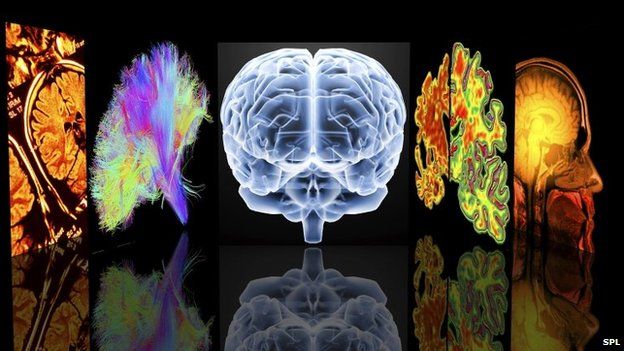GPs to be paid £55 for each dementia diagnosis
- Published
- comments

Family doctors in England are to be paid £55 for each patient they diagnose with dementia, NHS bosses say.
NHS England said the aim of the six-month £5m scheme was to increase the number of sufferers who receive treatment for the condition, which causes a decline in brain function.
It is estimated up to 90,000 patients are living with undiagnosed dementia.
But the Patients Association called it "a step too far" that would mean a "bounty on the head" of some patients.
Fewer than half of the 800,000 people in the UK who are estimated to have dementia have been formally diagnosed.
Dementia is an umbrella term used for a collection of symptoms resulting from a number of different diseases of the brain.
There are many types but all tend to affect brain function and cause problems with memory, mental agility, language skills, and the ability to carry out everyday tasks.
Dr Brian Hope: "I don't think for one minute ..[people] would make a false diagnosis in order to earn £55"
'Devastating' condition
NHS England has aimed to diagnose two thirds of people with dementia by 2015.
Some practices are diagnosing far fewer - and this £5m fund will reward them for getting nearer to that level.
NHS England said it was "not just payment for diagnosis" and GP practices would have to form a detailed plan and show improving diagnosis rates.
It may include measures such as improving the way cases are recorded by a practice - so they are counted properly, or visiting care homes to assess very elderly people who have not previously been checked for dementia.
There is already a £42m scheme in England where GP practices were paid for offering appropriate assessments of people who came in with memory problems, or those with conditions which put them at increased risk of the disease.
Once patients have been diagnosed, there are further incentives worth £31m under the existing scheme, linked to delivering care for dementia patients.
Dr Martin McShane, national director for long term conditions at NHS England, said: "Dementia can be devastating both for individuals and their families.
"We know that more needs to be done across the health service to ensure that people living with dementia are identified so that they can get the tailored care and support they need.
"This additional investment is part of a larger range of measures to support GPs in their work tackling dementia."
How common is dementia?
- It is predicted there will be around 850,000 people in the UK with dementia in 2015
- It mainly affects people over the age of 65
- Approximately one in 14 people over the age of 65 have dementia
- There are more than 40,000 people in the UK under the age of 65 who have dementia
Source: Alzheimer's Society
However, Prof Sir Simon Wessely, president of Royal College of Psychiatrists, said the scheme would not be effective without investments in social care and dementia research.
"This government has done well to increase funding and awareness of dementia, and I believe even more needs to be done," he said.
"But at the moment evidence favours either improving social care, or investing in research to find new treatments that actually modify the course of the disease. Until that happens I can see little point in this initiative.
Katherine Murphy, chief executive of the Patients Association, said the scheme was "a distortion of good medical practice".
"We know GPs receive incentive payments to find all sorts of conditions, such as high cholesterol, raised blood pressure and diabetes - but this seems a step too far. It is putting a bounty on the head of certain patients," she said.
"Good GPs will be diagnosing their dementia patients already. This seems to be rewarding poor GPs.
"There is an issue of people presenting late with dementia to doctors, but this is not the right way to go about tackling that. If people were given hope that something could be done, that would be the greatest incentive for coming early."
However, the Alzheimer's Society said: "There is a long tradition of supporting GP practices to tackle neglected areas. People worried about their memory and their carers deserve that support."
Tailored support
NHS England has already committed to ensuring two thirds of the estimated number of people with dementia are identified and receive high-quality post diagnostic support by 2015 - but has admitted data showed progress towards that target was much lower than expected.
Health chiefs have identified a gap of around 90,000 patients - an average of 12 per practice - who could benefit from a more timely diagnosis, for which an additional £5m has been made available to boost existing work to identify people with dementia so tailored support can be put in place.
How GP practices are funded
•Just over 50% is a lump sum to cover the cost of essential services, based on patient numbers, size of elderly population, amount of deprivation etc
•Practices earn additional funding, about 20%, through a points-based system according to how well they manage common chronic diseases, like asthma and diabetes, as well as patient experience and general organisation of the practice
•Payments are also given for optional "enhanced services", such as flu jabs, childhood immunisations and minor surgery. The new £55 payment, which will pay GP surgeries for the extra patients diagnosed with dementia between now and March, falls into this category
•In addition some get extra money for services targeting specific local problems
- Published17 October 2014
- Published18 June 2014
- Published19 June 2014
- Published5 December 2013